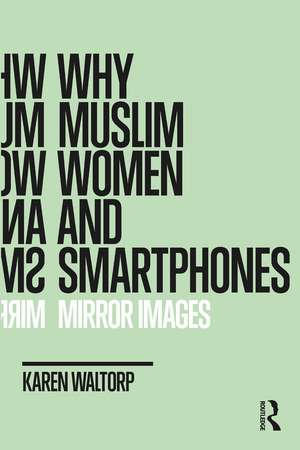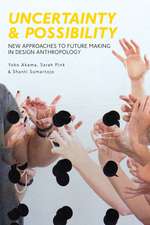Why Muslim Women and Smartphones: Mirror Images
Autor Karen Waltorpen Limba Engleză Hardback – 20 feb 2020
| Toate formatele și edițiile | Preț | Express |
|---|---|---|
| Paperback (1) | 382.57 lei 6-8 săpt. | |
| Taylor & Francis – 30 sep 2021 | 382.57 lei 6-8 săpt. | |
| Hardback (1) | 598.59 lei 6-8 săpt. | |
| Taylor & Francis – 20 feb 2020 | 598.59 lei 6-8 săpt. |
Preț: 598.59 lei
Preț vechi: 802.15 lei
-25% Nou
Puncte Express: 898
Preț estimativ în valută:
114.54€ • 122.48$ • 95.50£
114.54€ • 122.48$ • 95.50£
Carte tipărită la comandă
Livrare economică 18 aprilie-02 mai
Preluare comenzi: 021 569.72.76
Specificații
ISBN-13: 9781350127357
ISBN-10: 1350127353
Pagini: 200
Dimensiuni: 156 x 234 x 18 mm
Greutate: 0.53 kg
Ediția:1
Editura: Taylor & Francis
Colecția Routledge
Locul publicării:Oxford, United Kingdom
ISBN-10: 1350127353
Pagini: 200
Dimensiuni: 156 x 234 x 18 mm
Greutate: 0.53 kg
Ediția:1
Editura: Taylor & Francis
Colecția Routledge
Locul publicării:Oxford, United Kingdom
Cuprins
Foreword by Sarah Pink. Acknowledgements. Introduction: al-Harakat. Image List. Playlist. A. Smartphone Affordances of the Smartphone. Touch and Crucial Connectivity. Secrets and Smartphones a. Cyborg Cyborg Ethics for an Accountable Multi-modal Anthropology. Kitab al-Manazir and Cyborg Optics. Parallax as a Harakat Move and a Speaking Nearby B. Hanan al-Noerrebro: Affections for the Neighborhood An Urban Habitat - a Typical Blaagaarden Girl. The Ghetto, the Square, Behind the Curtain. Facebook Flirt: The Stabbing of Taher b. What's in a Field Enacting Hybridity. Harakat and Composite Habitus. Perceiving Affordances C. Hijab, Desire, Social Control Entanglements of Free Speech and Veiled Women. 'Playing with the Scarf is Playing with Our Religion'. Modest/Desire. Orientalism, Freedom, State Control. Smartphone as Valve and Part-revolution? Freedom/Choice. So Muslim Women Need Saving? D. Dreams and the Imaginal realm – Alam al-Mîthal The Kidnapping. Moral/Laws. Sab'r enacted and shared in social media. Images and Mirrors. Imaginal realm and Virtuality. Composite Habitus. The Flow of (Mirror) Images and Future-Making. Bibliography. Index.
Notă biografică
Karen Waltorp is an Associate Professor at the University of Copenhagen, Denmark.
Recenzii
"Karen Waltorp's intimate and sensitive exploration of the world as navigated by young Danish Muslim women through their smart phones is both theoretically innovative and ethnographically rich. Operating as window, mirror, screen, and relational device for anthropologist and research participants alike, the smart phone emerges as a rich and complex medium through which diasporic and ethnographic imaginaries are made real. This is digital anthropology at its best." - Emma Tarlo, Goldsmiths, University of London, UK
"Original, well written, persuasive. Karen Waltorp fluently moves between scales—the person, the apartment, the neighborhood, the nation, and international ties—and among disciplines, to analyze the spaces, relationships, and actions that young Muslim women in Denmark establish through their phones." - Laura Marks, Simon Fraser University, Canada
"This is a stunning and powerful book that, through a series of innovative research methods, creates a beautiful and nuanced ethnography full of intimacy and insight - a future classic in the anthropology of media." - Christopher Wright, Goldsmiths, University of London, UK
"Why Muslim Women and Smartphones: Mirror Images offers an ethnographically rich, methodology innovative and brilliant contribution to the study of contemporary social life. It shows how the smartphone has become a key witness to much of what life offers—from births to deaths; from the ordinary to extraordinary, from birth to death—and much else besides. In doing it builds an intimate portrait of women’s relations, hopes, fears and futures and is likely to become an important reference point that has relevance across disciplines." - Andrew Irving, Professor of Anthropology, University of Manchester, UK
"Waltorp develops powerful conceptual tools for us to rethink anthropology as a project that can be tilted towards seeing together and differently rather than rendering worlds transparent….what does it teach us about another, possible anthropology (Pandian, 2019)? What are the opportunities and limits of a harakat ethnography as it takes up the subversive, playful, and reflexive digital play of the young Muslim women from Blaagaarden as a mode of knowing together? Overall, the book offers a compelling way forward in theorizing digital-visual methods and will be a vital addition to teach upper-level undergraduate and graduate students contemporary approaches to (multimodal) anthropology. …Waltorp utilizes a novel writerly strategy. She sets up the book to alternate between ethnographically grounded chapters that weave together – through the description and analysis of images and scenes – a composite picture of the worlds of her informants, and ‘mirror’ image chapters that attempt a ‘figure-ground reversal’ where the knowledge-making project undertaken in each ethnographically grounded chapter becomes an object of scrutiny. Through this juxtaposition, Waltorp explores the meaning-making practices and embodied encounters that place the smartphone at the centre of what she calls a real virtuality, a correspondence between the phenomenological and iterative representations of it. Throughout, she provides a deeply reflexive account of her position and relationship with the young women as an anthropologist seeking to understand cultural worlds nearby, in the country that she calls home as an ethnic Dane. Waltorp’s keen sensibility around the limits of ethnography – whether wired through the digital or otherwise – demonstrates a deep understanding of what Edouard Glissant (1991) calls the right to opacity, a recognition of ‘that which cannot be reduced’ (52)." - Ethiraj Gabriel Dattatreyan in Ethnos
"Original, well written, persuasive. Karen Waltorp fluently moves between scales—the person, the apartment, the neighborhood, the nation, and international ties—and among disciplines, to analyze the spaces, relationships, and actions that young Muslim women in Denmark establish through their phones." - Laura Marks, Simon Fraser University, Canada
"This is a stunning and powerful book that, through a series of innovative research methods, creates a beautiful and nuanced ethnography full of intimacy and insight - a future classic in the anthropology of media." - Christopher Wright, Goldsmiths, University of London, UK
"Why Muslim Women and Smartphones: Mirror Images offers an ethnographically rich, methodology innovative and brilliant contribution to the study of contemporary social life. It shows how the smartphone has become a key witness to much of what life offers—from births to deaths; from the ordinary to extraordinary, from birth to death—and much else besides. In doing it builds an intimate portrait of women’s relations, hopes, fears and futures and is likely to become an important reference point that has relevance across disciplines." - Andrew Irving, Professor of Anthropology, University of Manchester, UK
"Waltorp develops powerful conceptual tools for us to rethink anthropology as a project that can be tilted towards seeing together and differently rather than rendering worlds transparent….what does it teach us about another, possible anthropology (Pandian, 2019)? What are the opportunities and limits of a harakat ethnography as it takes up the subversive, playful, and reflexive digital play of the young Muslim women from Blaagaarden as a mode of knowing together? Overall, the book offers a compelling way forward in theorizing digital-visual methods and will be a vital addition to teach upper-level undergraduate and graduate students contemporary approaches to (multimodal) anthropology. …Waltorp utilizes a novel writerly strategy. She sets up the book to alternate between ethnographically grounded chapters that weave together – through the description and analysis of images and scenes – a composite picture of the worlds of her informants, and ‘mirror’ image chapters that attempt a ‘figure-ground reversal’ where the knowledge-making project undertaken in each ethnographically grounded chapter becomes an object of scrutiny. Through this juxtaposition, Waltorp explores the meaning-making practices and embodied encounters that place the smartphone at the centre of what she calls a real virtuality, a correspondence between the phenomenological and iterative representations of it. Throughout, she provides a deeply reflexive account of her position and relationship with the young women as an anthropologist seeking to understand cultural worlds nearby, in the country that she calls home as an ethnic Dane. Waltorp’s keen sensibility around the limits of ethnography – whether wired through the digital or otherwise – demonstrates a deep understanding of what Edouard Glissant (1991) calls the right to opacity, a recognition of ‘that which cannot be reduced’ (52)." - Ethiraj Gabriel Dattatreyan in Ethnos
Descriere
Using an assemblage approach to study how Muslim women in Norrebro, Denmark use their phones, Karen Waltorp examines how social media complicates the divide between public and private in relation to a group of people who find this distinction of utmost significance.



























